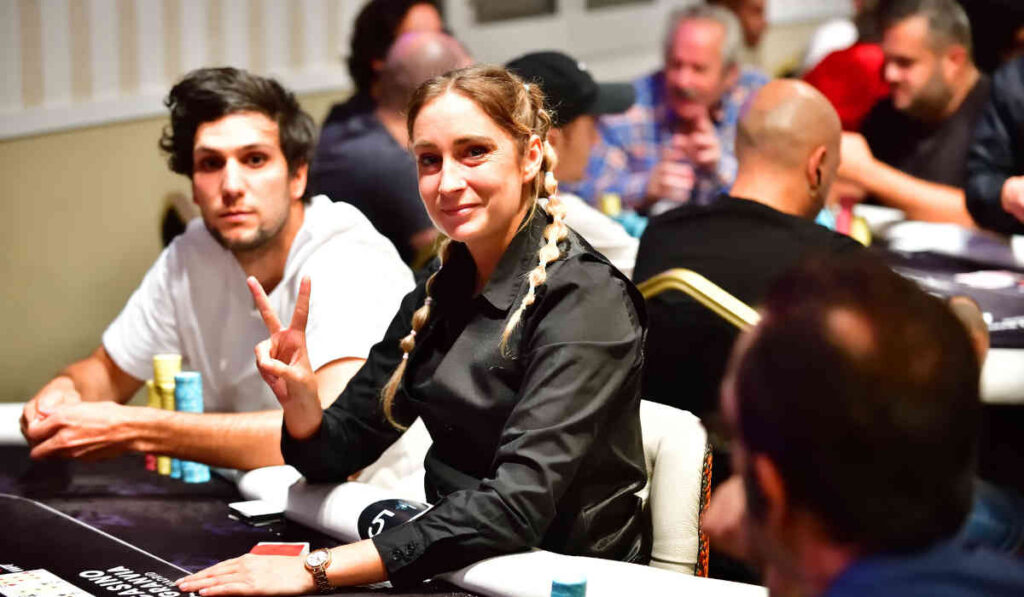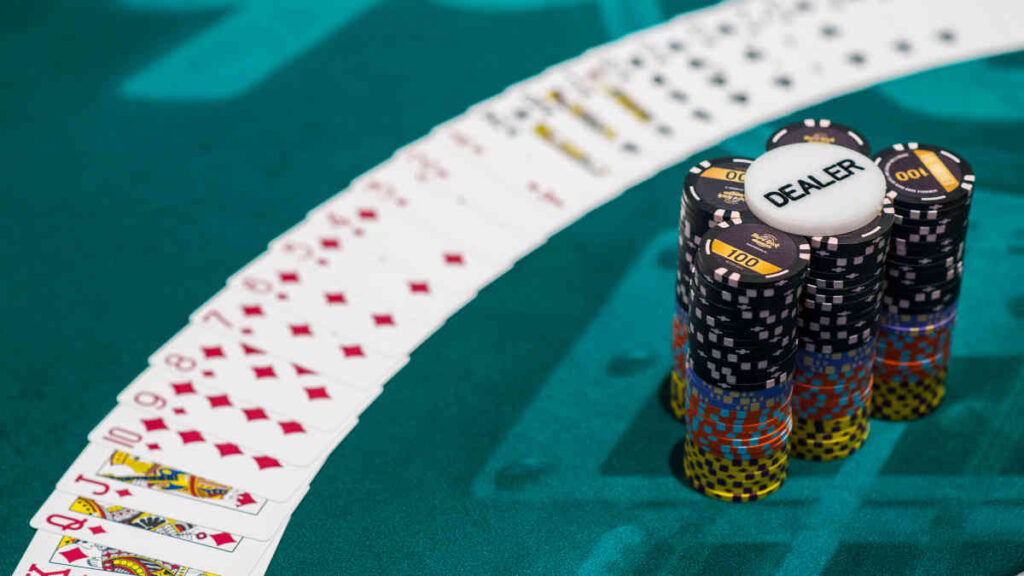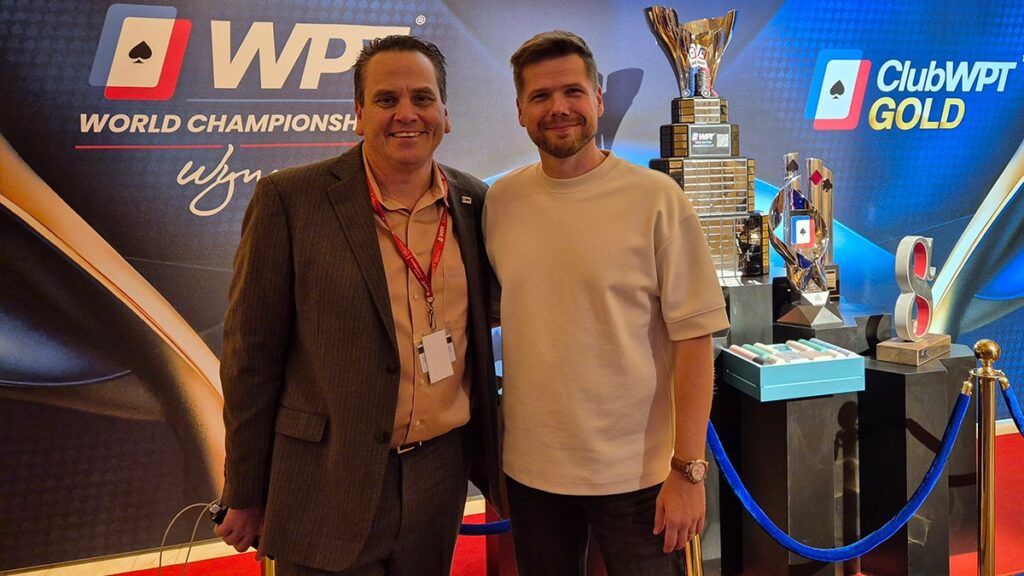Being able to play in the World Series of Poker (WSOP) is a dream for many poker players. For hundreds of dealers who make the event possible, the WSOP is a grueling, rewarding, and unforgettable chapter in their professional lives.
Here’s what it’s really like to work the WSOP from the dealer’s side of the felt, taken from the pages of Shuffle Up and Deal With It: Tales from Dealers Worldwide by Sara O’Connor (available now on Amazon).
Baptism by Fire
For many dealers, their first WSOP is a crash course in endurance. “During the 2022 WSOP, I was thrown into the fire,” says Robert “Foosball” Foos, 69 years old. “The dealers were working 12-16 hours a day. It was exhausting and exhilarating.”
That intensity is echoed by James, 40 years old, who recalled:
In Vegas, I worked six days a week for at least 10 hours a day. … They kept me longer than most dealers because of my experience. That lets me work and earn more.
With respect to what he wished players knew about dealing, Jeffrey San Gabriel, 48 years old, shared that, “It’s a grind for the dealers, too. We work long hours under adverse conditions, so sometimes we do make mistakes.”
While grueling, the work can be thrilling for newcomers. One anonymous dealer turned floor staffer from Nevada shared, “It’s like a dream come true working for the WSOP. I got to work the Main Event, and I was honestly fighting back tears.”
The pressure is intense, but for those who survive the early days, the rewards go beyond just the paycheck.
A Live Performance With No Room for Error
Dealing isn’t just a job—it’s a performance. A dealer is under constant scrutiny from players, supervisors, and in some cases, a global broadcast audience.
Dealing poker isn’t just a job,” says James. “It’s been the ride of a lifetime. But even he wasn’t immune to rookie mistakes. “My pitching hand was so sweaty that I touched the muck and cards stuck to me! I had to spread out all seven exposed cards. I was so embarrassed!
The stakes only grow when cameras are rolling. One Michigan dealer recalled,
Broadcasting poker changes how you deal. … The tables are grotesquely too large. I’m 6’1”, and I had to stand up to reach the cards. … You have to pitch them differently.
James, chosen to deal the final table of a $250,000 Super High Roller, was reminded of that pressure by a railbird: “‘Don’t fuck up,’ he said. But I wasn’t nervous—I imagined I was just dealing cards to two friends.”
When Mistakes Happen
Even the best dealers can misstep under pressure. “I made a huge mistake at the WSOP by breaking a table that wasn’t supposed to be broken,” said a Nevada-based dealer. “And I once pushed a pot to the wrong player in a cash game. Luckily, they had the same hand, so we chopped the pot.”
Robert Foos also had an early lesson.
A player counted out chips to call an all-in. I didn’t count them and pushed the pot. Turns out the stack was short. We had to go to the cameras. … Now I always count the stacks. I never let the players do it.
But mistakes often serve as the best teachers. “I never repeated that mistake again,” James says of his sticky palm debut. “Eventually, they trusted me with larger buy-in events.”
Highs, Lows, and Everything in Between
The emotional terrain of the WSOP can shift on a dime. Leann, 42 years old, tells of the time Chris Moneymaker and the entire table had a royal flush on the board. Moneymaker bluffed six players out of the pot!
Chris bets and everyone folds. He was playing the board! He asks me to leave the board; then, he asks the table why the heck they folded.
There are somber moments, too.
There was a player who died on the floor at the WSOP,” says the anonymous dealer in Nevada. “He had a heart attack, hit the floor, and never got up again. … We’ve lost countless players over the years that we’ve come to absolutely love.
A Tight-Knit Tribe
Despite the intensity, there’s a powerful sense of community among dealers. “It’s like summer camp,” says Riley, a 41-year-old who’s been dealing since 2008.
There’s camaraderie amongst dealers and a ton of floor people. It’s a tight-knit community. If you’re a poker nerd, it’s the place to be.
You learn your trade and get better after talking to people and seeing how they do things,” Riley adds. “A couple of the guys I met ended up being in my wedding.
Foos echoes that sentiment: “The relationships you make become like an extended family. … We are a community, and like soldiers, we have a common bond.”
The Human Side
For Leann, it’s the little gestures that matter most. “The nicest a person has ever been to me involved, of all things, hot sauce,” she laughs. A guy got sauce on her sleeve and tipped her every time he won, including enough to cover dry cleaning. “I probably made about $300 from him that night!”
She added that, “the biggest thing is when players get up to come say, ‘hi’.” Sometimes, it’s that simple, folks. Kindness pays. “Phil Hellmuth will do that, and he’s one of my favorite regulars.”

Dealers form bonds with each other and the players. “A local cardroom is like a family,” says the Nevada dealer. What brings Jeffrey coming back to deal the WSOP year after year?
I love my co-workers, as they are the best in the world. And the frantic energy, some call it chaos, is unlike anything else in poker. I wouldn’t miss it for the world!
Road Warriors
Many WSOP dealers follow the poker circuit all year.
After the WSOP, I traveled to North Carolina to deal a WSOP Circuit Event, followed by the Council Bluffs Circuit Event, and the Choctaw Oklahoma Circuit Event. says Foos.
In 2023, I went to West Palm Beach, Florida, back to Choctaw, and then back to the WSOP. … I also deal charity games in Houston.
The lifestyle isn’t cheap. Traveling dealers “need to share expenses,” Foos advises. “It is challenging to make enough money to support yourself as expenses keep rising and the market is getting saturated with tournaments.”
But for many, the lifestyle is worth it. “A dealer’s world is anything but ordinary,” says the Michigan dealer. “I actually leave for Alaska tomorrow.” The WSOP allows him to travel and do what he loves.
Jeffrey shares how he’s “looking forward to seeing all of my dealer and player friends. I don’t travel the circuit, so this is the one time of year I see those who do.” He travels from California each year to live in Las Vegas for the summer.
Grace Under Pressure
Sometimes, the most difficult players are the most memorable. “I adore Allen Kessler,” says a 37-year-old anonymous dealer going by the name of Sumone Elsa, “but he can be impossible to deal to sometimes. He will call the floor on hands when he’s not even involved!”
Yet seasoned dealers know when to let things slide. A gruff player needled the Michigan dealer their entire down:
But he was absolutely awful at the game, a truly terrible player. He lost a couple hundred dollars to a guy who tipped me $10. I realized that if I didn’t call the floor over to get rid of this guy, everyone would tip me well.
So, I didn’t call the floor. I ended up making $80 that down! I learned that sometimes it’s best to just let bad talkers go as long as everyone remains comfortable.
Final Thoughts
Whether it’s dealing a final table or managing a mistake with grace, dealers are the often unsung heroes of the WSOP. They are, as James puts it, “in the trenches” with the players—helping make poker history one hand at a time.
Whether you’re dealing (thank you!) or playing this summer (good luck and run good!), stay safe and have tons of fun!


